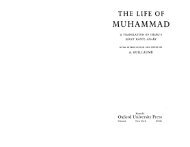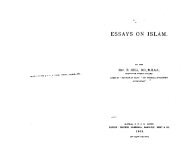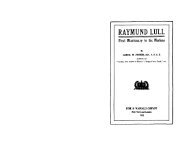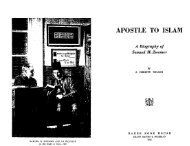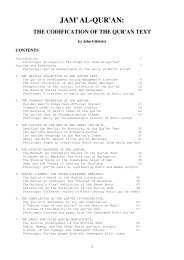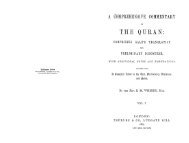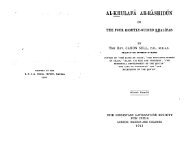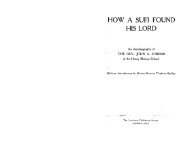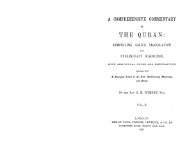Islam Its Belief and Practices - Radical Truth
Islam Its Belief and Practices - Radical Truth
Islam Its Belief and Practices - Radical Truth
Create successful ePaper yourself
Turn your PDF publications into a flip-book with our unique Google optimized e-Paper software.
108 ISLAM ITS BELIEFS AND PRACTICES<br />
(v) If a woman exonerate her husb<strong>and</strong> from any<br />
part or even from the whole of the<br />
dower, it is approved.<br />
(vi) If a man retires with his wife, <strong>and</strong> there be<br />
no legal or natural obstruction to the<br />
conjugal relation, <strong>and</strong> he afterwards<br />
divorce her, the whole dower in this case<br />
goes to her. Such retirement is called<br />
Khilwatu'~-~aQ.iQ., the complete retirement.<br />
(vii) If a man retire with his wife whilst one of<br />
them is sick, or fasting in the month of<br />
Rama4an, or in the IQ.ram of a pilgrimage,<br />
whether obligatory or voluntary, or<br />
of a visitation at the shrine of the<br />
prophet, or whilst the woman is in her<br />
courses-this is not regarded as a<br />
Khilwatu·~-~aQ.iQ. (see above vi) or complete<br />
retirement, insomuch that if the<br />
man were to divorce his wife after such<br />
a retirement, the woman is entitled to<br />
her half dower only; because all the<br />
above circumstances are bars to the<br />
conjugal relation.<br />
(viii) When the husb<strong>and</strong> has duly paid to his wife<br />
the whole of her dower, he is at liberty<br />
to carry her wherever he pleases.<br />
(ix) A woman may refuse to admit her husb<strong>and</strong><br />
to conjugal relation until she receives<br />
her dower of him. A woman is also at<br />
liberty to resist her husb<strong>and</strong> taking her<br />
upon a journey until she shall have<br />
received her dower of him.<br />
MARRIAGE AND DIVORCE 109<br />
(x) It is further to be observed, that even if the<br />
husb<strong>and</strong> should have conjugal relation,<br />
or should have been in Kbilwatu'~-~aQ.iQ.<br />
with his wife, yet the rule is the same;<br />
that is to say, she is still at liberty to<br />
refuse to admit him to conjugal relation,<br />
or to resist his taking her upon a<br />
journey, until such time as she shall have<br />
received the whole of her prompt dower<br />
from him. But she is, notwithst<strong>and</strong>ing,<br />
entitled to her subsistence.<br />
(xi) Dower is of the following kinds:<br />
(a) Mihr Mu'ajjal, "prompt dower," the<br />
dower stipulated to be paid promptly<br />
after marriage.<br />
(b) Mihr Muwajjal, "delayed dower," the<br />
dower stipulated to be paid at some<br />
future period, as a year, or so forth.<br />
(c) Mihru'l-Mithal, "proper dower," is<br />
that which is:regulated, in its amount<br />
or value, by that of the dower of her<br />
paternal relations, such as her<br />
paternal sisters or aunts, or the<br />
daughters of her paternal uncles, <strong>and</strong><br />
so forth. A woman's Mihru'l-Mithal<br />
is not to be regulated by the dower<br />
of her mother or her aunt, where<br />
they are not descended of her<br />
father's family.<br />
(5) The Absence of Legal Disabilities,<br />
The prohibitions to marriage are based on the teaching<br />
of the Qur'an, Sura 4: 26,27. According to the explanation<br />
given by Sayyid Amir Ali, the prohibitions may be



